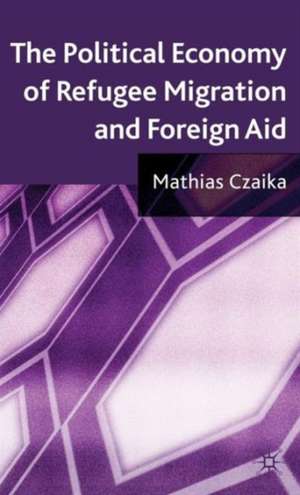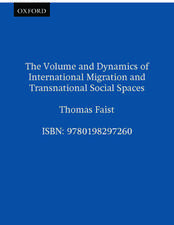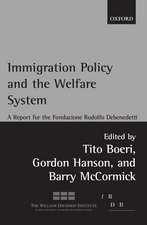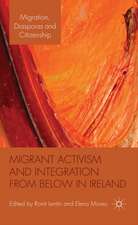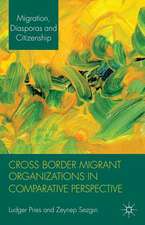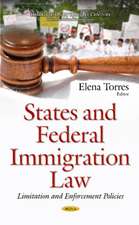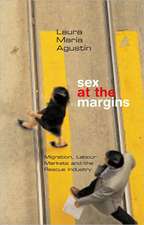The Political Economy of Refugee Migration and Foreign Aid
Autor M. Czaikaen Limba Engleză Hardback – 25 iun 2009
| Toate formatele și edițiile | Preț | Express |
|---|---|---|
| Paperback (1) | 634.68 lei 6-8 săpt. | |
| Palgrave Macmillan UK – 25 iun 2009 | 634.68 lei 6-8 săpt. | |
| Hardback (1) | 639.25 lei 6-8 săpt. | |
| Palgrave Macmillan UK – 25 iun 2009 | 639.25 lei 6-8 săpt. |
Preț: 639.25 lei
Preț vechi: 752.06 lei
-15% Nou
Puncte Express: 959
Preț estimativ în valută:
122.32€ • 133.29$ • 103.07£
122.32€ • 133.29$ • 103.07£
Carte tipărită la comandă
Livrare economică 23 aprilie-07 mai
Preluare comenzi: 021 569.72.76
Specificații
ISBN-13: 9780230576889
ISBN-10: 0230576885
Pagini: 224
Ilustrații: XIV, 205 p. 8 illus.
Dimensiuni: 140 x 216 x 18 mm
Greutate: 0.39 kg
Ediția:2009
Editura: Palgrave Macmillan UK
Colecția Palgrave Macmillan
Locul publicării:London, United Kingdom
ISBN-10: 0230576885
Pagini: 224
Ilustrații: XIV, 205 p. 8 illus.
Dimensiuni: 140 x 216 x 18 mm
Greutate: 0.39 kg
Ediția:2009
Editura: Palgrave Macmillan UK
Colecția Palgrave Macmillan
Locul publicării:London, United Kingdom
Cuprins
Acknowledgements Table of Contents List of Figure List of Table Abbreviations PART I: INTRODUCTION Research Objective Research Outline PART II: FORCED MIGRATION PATTERNS AND POLITICS Introduction Migration Characteristics Migration Types Migration Causes International Actors for Refugee Protection UNHCR and its Historical Background Other International Organizations National States Refugee Politics Burden-Sharing and International Cooperation Migration Prevention and Aid Assistance PART III: INTERNATIONAL REFUGEE BURDENS Introduction Assessing the Refugee Burden to Host Countries Methodology of a Refugee Burden Index Refugee Capacity Index Ability-to-care Socio-political Acceptance of Immigrants Politico-institutional Performance Refugee Gaps Refugee Burden Index Results Concluding Remarks PART IV: DETERMINANTS OF FORCED DISPLACEMENT Introduction Conflict History and Displacement in Aceh, Indonesia Theoretical Background of Displacements Empirical Analysis of Displacement in Aceh Data Source and Descriptive Statistics Empirical Strategy Estimation Models Main Control Variables Estimation Results Concluding Remarks PART V: THE POLITICAL ECONOMY OF REFUGEE MIGRATION Introduction Model Analysis The Cross-Border Option The Asylum-Seeking Option Counter-asylum Policies Defensive Asylum Policy: Asylum Restriction Decline in Self-Reliance in the Cross-the-Border Country Decline in Recognition Rates in the Western Asylum Country Proactive Asylum Policy: Migration Preventive Aid Transfers Aid to the First Asylum Country Aid to the Country of Origin Self-financing Proactive Asylum Policy Concluding Remarks PART VI: ASYLUM COOPERATION AMONG ASYMMETRIC COUNTRIES Introduction Literature Review The Analytical Framework Asylum Cooperation in the European Union Concluding Remarks PART VII: REFUGEE MOVEMENTS AND AID POLITICS Introduction Aid and Refugee Migration Policies Aid Allocation Patterns and Statistics UN Diplomacy and Aid Allocation Data Results Concluding Remarks PART VIII: AID ALLOCATION AND ASYLUM MIGRATION Introduction Aid Allocation Literature Review The Model Comparative Statics Empirical Evidence Data and Methodology Empirical Results Concluding Remarks PART VIIII: REFUGEE MOVEMENTS AND AID RESPONSIVENESS Introduction Refugee Movements: Some Policy Options Empirical Analysis Methodology Data Results Aggregate Aid Allocation Donor-specific Aid Allocation Concluding Remarks PART X: CONCLUSION Summary Policy Implications A Appendix B Bibliography
Recenzii
'Lack of economic analysis has long reduced the intellectual and practical value of research on refugees. This book makes a major contribution to filling that gap. Its rigorous but accessibly presented applications of economic theory and econometrics to forced migration and related policies shed new light on key issues, and will stimulate others to do more research of this type and quality.' - Professor Adrian Wood, Department of Economics, Oxford University, UK
Notă biografică
MATHIAS CZAIKA is an Economist at the Univeristy of Freiburg, Germany. He received his graduate degree in Economics from University of Konstanz in 2001. He was research assistant at the University of Freiburg, where he received a Ph.D. in Economics in 2008. As part of his research on refugee migration, he stayed for some time at the Refugee Studies Center of University of Oxford and the UNHCR headquarter in Geneva.
